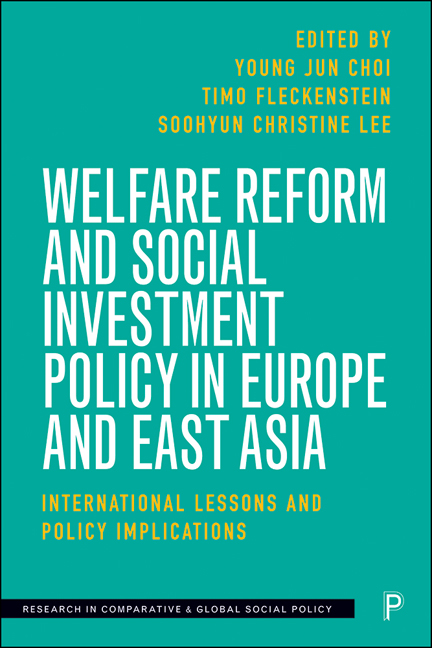 Welfare Reform and Social Investment Policy in Europe and East Asia
Welfare Reform and Social Investment Policy in Europe and East Asia Book contents
- Frontmatter
- Contents
- List of figures and tables
- Notes on contributors
- Acknowledgements
- Preface from the series editors
- 1 Introduction: social investments and welfare reform in Europe and East Asia
- 2 Work–family policy expansion and the idea of social investment: the cases of Germany, England, South Korea and Japan
- 3 Private education in South Korea: lessons for the West from past mistakes?
- 4 How do family background and shadow education affect academic performance and labour market outcomes in South Korea? Reasons for redistributive social investment
- 5 Employability, higher education and the knowledge economy
- 6 Does social investment make the labour market ‘flow’? Family policies and institutional complementarities in Italy, Spain, Japan and South Korea
- 7 The social investment approach and gender division of housework across East Asia and Europe
- 8 Employment outcomes of social investment in latecomer countries
- 9 Estimation of the human capital depreciation rate: an international comparison and policy implications in South Korea
- 10 Changing patterns of grandparenting and their implications for active ageing in England and South Korea
- 11 The governance of social investment policies in comparative perspective: long-term care in England and South Korea
- 12 Towards greater social investments and equality in Europe and East Asia: policies and politics
- Index
12 - Towards greater social investments and equality in Europe and East Asia: policies and politics
Published online by Cambridge University Press: 21 December 2021
- Frontmatter
- Contents
- List of figures and tables
- Notes on contributors
- Acknowledgements
- Preface from the series editors
- 1 Introduction: social investments and welfare reform in Europe and East Asia
- 2 Work–family policy expansion and the idea of social investment: the cases of Germany, England, South Korea and Japan
- 3 Private education in South Korea: lessons for the West from past mistakes?
- 4 How do family background and shadow education affect academic performance and labour market outcomes in South Korea? Reasons for redistributive social investment
- 5 Employability, higher education and the knowledge economy
- 6 Does social investment make the labour market ‘flow’? Family policies and institutional complementarities in Italy, Spain, Japan and South Korea
- 7 The social investment approach and gender division of housework across East Asia and Europe
- 8 Employment outcomes of social investment in latecomer countries
- 9 Estimation of the human capital depreciation rate: an international comparison and policy implications in South Korea
- 10 Changing patterns of grandparenting and their implications for active ageing in England and South Korea
- 11 The governance of social investment policies in comparative perspective: long-term care in England and South Korea
- 12 Towards greater social investments and equality in Europe and East Asia: policies and politics
- Index
Summary
The various chapters of this book have shown that we can observe increased social investment efforts in both European and East Asian countries. In family policy particularly, governments have made considerable efforts to improve work–family reconciliation policy (including early childhood education and care provisions) with the objective of promoting women's employment, child development and increasing fertility rates. Unsurprisingly, the social investment literature draws heavily on the experience of family policy expansion across the Organisation for Economic Co-operation and Development (OECD) member countries. In addition to greater public social investments, we find intensified private social investments in the domain of education. Families’ mobilisation of substantial resources for higher education is well documented, and student tuition has attracted much controversy in many OECD countries. Private tutoring (or shadow education) as private social investment has long enjoyed much prominence in East Asia, where it is a dominant feature of the lives of young learners. It has, however, received less attention that shadow education is on the rise in Europe too.
Besides the economic rationales that are typically associated with social investment strategies, policy-makers, especially on the political left, are also driven by the desire to improve equality of opportunities, which is thought to eventually translate into greater social equality, including greater gender equality. Most notably, childcare provisions promote women's employment participation and thereby increasing their economic independence, and early education provisions are widely assumed to benefit children from disadvantaged backgrounds the most. It is hoped this will close the achievement gap between children from different socio-economic backgrounds. However, as the literature on the Matthew effect suggests (Cantillon, 2011; Bonoli et al, 2017), the relationship between greater social investments and greater social equality is not necessarily straightforward, as publicly funded childcare provisions, for instance, are disproportionately taken up by middle-class families, and thus disproportionately promote the employment participation of middle-class women and the development of their children.
In Chapter 8, looking at employment outcomes of social investment policies in latecomer countries, Jaehyoung Park finds some empirical support for the Matthew effect, including evidence with regard to work–family reconciliation policy; and in Chapter 6, Ijin Hong and Jieun Lee present an institutional analysis showing how labour market regimes in the latecomer countries of Italy, Spain, Japan and South Korea undermine the effectiveness of work–family reconciliation policies and their objective of improving the economic activity rates of women.
- Type
- Chapter
- Information
- Welfare Reform and Social Investment Policy in Europe and East AsiaInternational Lessons and Policy Implications, pp. 315 - 348Publisher: Bristol University PressPrint publication year: 2021


